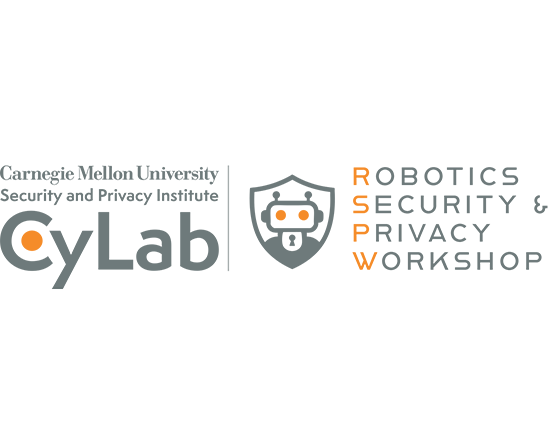Building a Secure and Trustworthy Future for Robotics
The proliferation of robotic systems from controlled environments to real-world applications in homes, factories, and critical infrastructure has created an urgent need for a holistic, system-wide approach to security and privacy. The CyLab Robotics Security and Privacy Initiative (RSPI) is a multi-year, interdisciplinary research program that brings together experts to define foundational challenges and outline a path forward for building a trustworthy robotics ecosystem that is secure by design.

Towards a Safe, Secure, and Privacy-Preserving Robotics Ecosystem
The organizers of the CyLab Robotics Security and Privacy Workshop have summarized the workshop's findings in a technical report, Towards a Safe, Secure, and Privacy-Preserving Robotics Ecosystem.
Research Challenges
Through the multi-year initiative, CyLab intends to develop a suite of novel foundations and technologies that address the following research challenges:
Foundational Concepts: Defining Threats and Approaches
Threat Models
In addition to attackers against traditional computing infrastructure, specialized threat models for robotics systems are needed because they frequently interact with the physical world and humans in the environment, and sometimes operate under real-time constraints. RSPI addresses these specialized threat models and offers strategies to help mitigate threats.
Systems Approaches to Security & Privacy in Robotics
Robotic systems involve the integration of complex mechanical, electrical, and software components within dynamic and uncertain environments. These integrations can create emergent security and privacy challenges that cannot always be anticipated in advance. RSPI explores the role of system-wide strategies for improving security and privacy in robotics, including assurance cases, risk assessment methodologies, and security- and privacy-by-design principles.
Core Components and Supply Chain: From Hardware to Software
Sensing and Hardware Privacy/Security
Undermining the security of a sensor or another component can render the data from that sensor useless or even undermine all downstream decisions from that component. On the flip side, the earlier in the pipeline privacy can be addressed, this can potentially aid confidentiality and security down the line. RSPI examines attacks and defenses on security and privacy for sensors and other hardware components.
Supply Chain Security re: Software and Hardware
Robotics systems contain complex software components and hardware components, which may come from a large number of sources, leaving a large attack surface for attackers to modify the component, causing security, privacy, or safety issues. RSPI researchers explore challenges and potential solutions to the supply chain security in the context of robotic systems.
Privacy & Security in Robotics Software Ecosystems
Software frameworks, middlewares, and package ecosystems such as ROS 2 enable modular and reusable robotics development but also introduce security, privacy, and safety challenges. RSPI identitifies the safety, security, and privacy challenges that arise from robotics software and explores the space of potential solutions.
Safety x AI and Machine Learning
Powerful AI technologies such as LLMs are increasingly being deployed in robotic systems, but they also introduce new, unique challenges for security, safety, and privacy. RSPI identifies potential use cases and risks of using AI in robotic systems and develops approaches for mitigating those risks.
Evaluation and Testing
Evaluation and Testing Frameworks
RSPI appraises current and develops new approaches to evaluating the security and privacy of robotic systems, and identify gaps and challenges in evaluation metrics, benchmarks, verification methods, and simulation-based and field testing.
External Factors: The Human and Regulatory Context
Human Factors
Many an allegedly-secure system has broken down as a result of its failure to address the human element. RSPI explores the ways humans interact with robotics and AI that go beyond interactions with other automated systems, and seeks to identify key questions and answers regarding human factors in security and privacy of robotics.
Policy Considerations
What regulations, certifications, standards, or policies should (or do) apply to security and privacy aspects of robotics? RSPI addresses this question in the context of existing regulations covering some aspects of robotics (e.g., in the U.S., FAA for flying robots and FCC for communication, FTC actions addressing unfair or deceptive practices resulting from poor security or privacy, or regulations governing medical devices and health data).
Meet our co-directors

Sarah Scheffler
Assistant Professor
Engineering and Public Policy, Software and Societal Systems Department

Christopher Timperley
Senior Systems Scientist
Robotics Institute, National Robotics Engineering Center
Become a sponsor
Interested in getting involved or sponsoring this initiative? Contact Michael Lisanti, Senior Director of Partnerships, at 412-268-1870 or mlisanti@andrew.cmu.edu.






